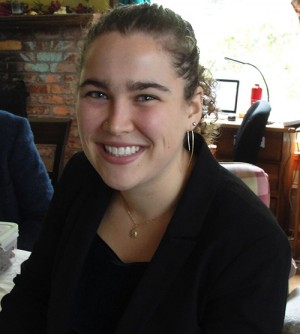By Danielle Puretz
 Good afternoon friends, family, faculty, and graduates. For many of us the Global Poverty courses we have taken together have been our most intimate. In this room alone, I am surrounded by mentors and peers among whom I have not only found meaningful inspiration but also deep camaraderie. So it is truly an honor and a privilege to be here addressing you today.
Good afternoon friends, family, faculty, and graduates. For many of us the Global Poverty courses we have taken together have been our most intimate. In this room alone, I am surrounded by mentors and peers among whom I have not only found meaningful inspiration but also deep camaraderie. So it is truly an honor and a privilege to be here addressing you today.
The Global Poverty & Practice minor is set up as a journey, and through our coursework we begin what becomes a recursive practice of questioning and critiquing strategies of poverty alleviation, the ethics of “global citizenship,” and where we lie within those discourses ourselves.
What makes our minor unique is our Practice Experience: the main requirement of which is time, a simultaneously minuscule and yet inconceivably large 240 hours.
For my Practice Experience, I focused on arts education and New Orleans.
Looking back, my Practice Experience was one of the most formative experiences of my time at Cal. Although upon returning to Berkeley, it didn’t feel formative, it felt incredibly unsettling, and I felt lost. I was unsure if I had made the right decision by going to New Orleans in the first place and I was feeling equally uneasy about then having to leave and come back to school.
Within the minor, we are taught to challenge the problems and ethics of voluntourism—destination-volunteering that benefits tourist volunteers more than “beneficiary” hosts. In critiquing this increasingly common phenomenon of service trips, we have to ask ourselves if this is also what we are setting ourselves up for with our practice experiences—doing “more harm than good.”
A number of times within my own Global Poverty journey, I’ve been required to read Ivan Illich’s “To Hell With Good Intentions.” As a speech he gave to Peace Corps volunteers almost 60 years ago, Illich’s words are as acerbic as ever: “The damage which volunteers do willy-nilly is too high a price for the blated insight that they shouldn’t have been volunteers in the first place…I am here to challenge you [he explained] to recognize your inability, your powerlessness and your incapacity to do the ‘good’ which you intended to do.”
As Global Poverty & Practice Minors, I believe that we have the best intentions.
However, we have surely put our fingers in our ears if, at any moment, we felt as if our benign intentions are enough. As we’ve all learned, the world does not begin the day we set out to do good. We are predated by centuries of systemic exploitation, which created the very poverty we so benevolently seek to eradicate. The courses we take in Global Poverty are meant to help us understand this history and our own positionality, as we set out to do social justice related work.
Along this journey, I have had quite a few moments of self-doubt, many of which somehow coincided with reading articles such as Illich’s. In these moments, I have found some distraction by mulling over a paradox Professor Ananya Roy shared with us Global Poverty 115: “To find ourselves in the space between the hubris of benevolence and the paralysis of cynicism.”
I remember initially hearing Professor Roy say these words in lecture, and it felt like a prophecy that would define the rest of my time within the minor. I arrived at Global Poverty, because I had such arrogant dreams of wanting to fight inequality and end poverty. I wanted personal fulfillment and the affirmation that I was indeed doing good work while contributing in some way to global change.
When Professor Roy’s words set in, I felt like a mirror had been held up to my ambition. I realized that this was my hubris—to think that with my good intentions, nothing I did could be conceived as anything other than altruism. In my will to change, I began to fear a trajectory where I would learn more and more about a world filled with greed, cruelty, and despair, only to be left in a psychosomatic paralysis. I was no longer just afraid of doing more harm than good; I was also afraid of becoming someone who would do nothing. As my fellow GPP student Shrey Goel mentioned, ignorance is ethically indefensible, but so too is choosing inaction. Thinking that neutrality might not be a political decision in itself is an expression of complicity in systems of exclusion.
Feeling pulled in different directions, motivated toward public service, but afraid of doing more harm than good, and terrified of doing nothing, I decided to let my curiosity get the better of me. Thus I proceeded to plan my practice experience in New Orleans.
Part of this planning is guided by the minor curriculum—thorough education and significant time commitment, we aim to set ourselves apart from volunteers who are more visibly in it for themselves. The minor facilitates “praxis”—the combination of theory and practice. We believe that sustained commitment and thorough education allow for us to build better relationships with the people we are working with. That these efforts may substantiate our presence where we are not solely putting more work on their plates. In New Orleans, I felt my own expectations to test myself, my knowledge, and my character—and have the depth and richness of the relationships I was building act as the metric for my achievement.
But when I returned to Berkeley, I felt ripped from all of the people I had been working with.
Fortunately, as Shrey so beautifully laid out, we are taught a self-reflective praxis, and experience this firsthand through our shared catharsis in the capstone course. I arrived on the first day of Global Poverty 196 not looking to be validated, but searching for some resolution and justification for the work that we did. I believe that all of us will remember Professor Khalid Kadir’s extravagant metaphor about climbing hills and mountains, building to his point that “there is no Mount Everest.” There is no end to the work we do; there is no closure or final affirmation that should ever go un-critiqued.
In looking at the Global Poverty journey as an educational experience, I want to suggest that there is value to this feeling of being unsettled. As Professor Clare Talwalker quoted Paulo Freire in our Methods course, “Those who authentically commit themselves to the people must re-examine themselves constantly.” I think that this practice of constant critiquing, questioning, and challenging is exhausting, but the unsettled feeling that comes with it is a discomfort that comes from learning, and it is necessary if we want to “do good” or at the very least learn from our mistakes.
Yet despite this realization, my anxiety about my hubris and potential to become paralyzed by cynicism lingered throughout my time in the capstone course. I was hanging onto the hope that I could grow out of my hubris without tumulting into such an opposite extreme. And on the very last day of this class, as I was still searching for my place along the spectrum of hubristic benevolence and paralyzing cynicism—I became critical of the dichotomy this analysis suggests.
I realized that another state to be wary of is the hubris of cynicism.
As we learn to constantly critique ourselves, it becomes easy to lapse into cynicism. And as we develop an association of cynicism to intellect, we learn that in playing pessimist, we may seem smarter or more well seasoned, an expert even. Cynicism acts as a shortcut, providing the guise of experience—that we’ve seen a lot and it doesn’t look good. I have learned that if I am cynical as I describe myself, I seem well versed in criticism, somehow more keenly aware of myself and the world around me. But how conceited is that? To think that we could ever know so much that we may be above the people that we work with and learn from, that their efforts aren’t enough, that our skepticism is superior to a tenacious perseverance of hope—makes me feel that cynicism is fundamentally twofold with a dangerous hubris.
To me, conflating hope with naiveté and cynicism with intellect demonstrates an arrogance that may need more than reflection to eradicate. As we hear “to hell with good intentions,” we need to be able to feel the discomfort that we may be doing the wrong thing, without using cynicism as a coping mechanism.
As I share with you one of my newfound fears of cynicism, I want to also reassure you of my faith in us to overcome it. Our minor has encouraged us to explore ourselves and given us theory to understand the space we occupy. And while our practice experiences were the climax of our journey, the core of our minor is community. It is no coincidence that we go through the different stages of this minor together, we are reflecting together, we are asking deeply personal and difficult questions together. Social justice work is difficult, but we share this responsibility, and take on these challenges in community.
Now we’re graduating, which is scary in and of itself. We must take with us our ability to understand complexity. My mom is an elementary school teacher, and when she takes her class outside to play softball she doesn’t keep score—she tells them that they are just out there to exercise. She has worked with children longer than anyone I know. Her expertise comes from her lived experience, and it is so visible when I go to her school and see how loved she is by her students, their families, and her colleagues. My mother has been my main teacher my whole life. The classroom she cultivates is a space free from failure, which I think is especially important for her second graders, so that they can learn to keep trying without fear of some ultimate failure. And in my understanding of complexity, education is a point of stability, where our failures are somewhat cushioned. So as we depart from that, we need to work on cultivating within ourselves an acceptance of failure as well as metrics of success where we do not find validation within the failures of others. We need to be able to dish out criticism as well as take it; we need to be understanding of unease, and comfortable with failure. We need to recognize that these are challenges that we need to work with, learn from, and find motivation to try again.
We now occupy a space of “educatedness”—able to understand that problems are more complex than meets the eye, that narratives are shrouded with hegemony, and that we must challenge the notion of expertise, while also doing justice to our educations. Recognizing that our degrees bring power and we are on some level experts ourselves. We are brave and we are curious; we are arrogant and we are fearful. Still, I am confident that our education and lived experiences have taught us the strength and humility to push back against injustice as well as the ability to receive the personal criticisms we undoubtedly will encounter. To do nothing is to accept the world as it is. To challenge and critique our world is ultimately an expression of hope: that while we will never reach Utopia, we can still work toward a better tomorrow.
At the very least, I hope we have learned that we are not alone. It has been an honor and a privilege learning with and from all of you. Thank you, and congratulations.
Danielle Puretz is a recent graduate with degrees in Theater and Performance Studies and Peace and Conflict Studies as well as a minor in Global Poverty & Practice. She has been selected for the John Gardner Public Service Fellowship, and will be spending the next year continuing her exploration of theater and social justice-related work.





